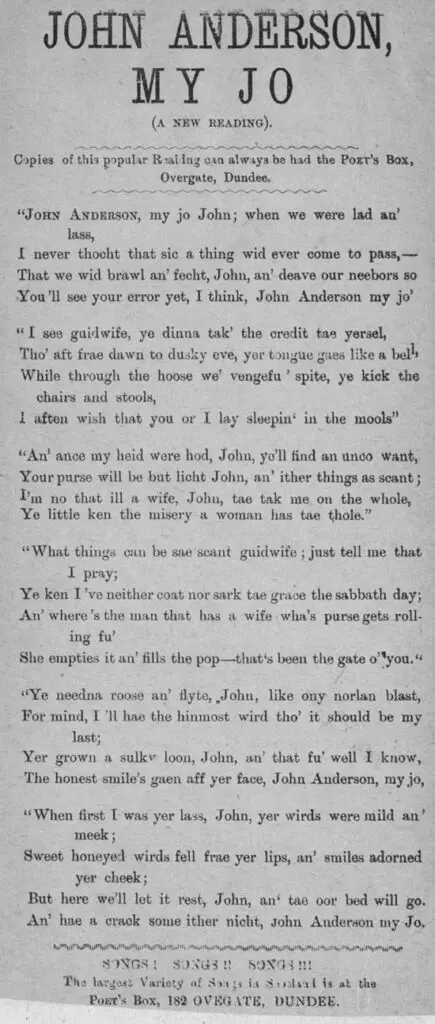The Scottish poet Robert Burns was a farmer in his early then he takes inspiration for writing poems. This is how he started his writing carrier and his piece of work made him a famous eighteenth-century poet.
“John Anderson my jo, John” is one of the best poems of Burns and his verse made the readers impressed.
Table of Contents
Summary
This is a short poem that consists of only two stanzas that are having eight lines. Robert Burns has a unique pattern of writing where most of the time repeat the title in the first line. Here he writes,
“John Anderson my jo, John,
When we were the first acquaint,
Your locks were like the raven,”
The first is very simple where he tells dedicating his sweetheart John Anderson. In the poems of Robert Burns, we naturally find Scottish words like ‘jo’ that means sweetheart.
Here, Burns calls his friend John a jo. When they first met John had locks that looked like the raven and his bonnie or beautiful eyebrows used to look like brant.
Maybe his brows were undressed that is why the poet called it brent. Suddenly the poet comes into the present time and utters that now the eyebrows look bald.
“Your locks are like the snaw,
but blessings on your frosty pow,
John Anderson, my jo!”
And locks now look like the snow. The poet is giving blessings to John that his frosty pow may stay safe. From that stanza, we can get to know that the poet loves John very much and that is why he called him a sweetheart and also want him to achieve more blessings.

This is how the poet is describing their memories. At the beginning of the next stanza, Burns again repeats the line and calls John Anderson a sweetheart.
“We clamb the hill thegither,
And monie a cantie day, John,
We’ve had wi’ ane anither;
Now we maun totter down, John,”
Here he is stating about their previous days and how they used to climb the hills. There were many cheerful, happy days. So there are memories and the lines are being written in a form of a letter that seems he is memorizing the days they passed.
Next to the lines, Burns says they had passed another day, months but now maybe they main or maybe tattered down by becoming lazy.
Bot the poet wants to go mountain climbing with John and wants to spend time together. He wants to sleep at the foot where they used to sit.
The poet is encouraged and wants to go hand in hand. In the last line poet again Calles by the name Dear John. Here the poem ends that is having a nostalgic feeling.
Analysis
“John Anderson my jo, John” is a very famous poem by Robert Burns but here we have a deep nostalgic sentiment. John Anderson is probably the poet’s friend either whom he spent many of his days.

But at his present time, he can not stay together because of many issues outside. But the wish of spending time together, climbing hills are making the poet crazy. The poet is remembering the days in this poem and also cherishing his days. So, this is a perfect poem of nostalgia.
Theme
Nostalgia is the central theme of the poem. Throughout the poem, Burns talks about John’s eyebrows, and locks because he is missing this look of John Anderson.
Except that poet has a love for his friend John with whom he went. His blessing nature speaks that he is a loving friend of John. So, these are the themes of the poem that worked as the pillars of the poem.
Literary Devices
Literary devices are also the other pillars of the poem because based on them the poem is established. Here Robert Burns used a rhyming pattern that is ‘ababaccd aeaeadfd’.
When a reader will find rhymes in lines it will be a pleasure to read. Maybe this is why Robert Burns used this.
Imagery is one of the major literary devices of the poem. When Robert Burns is describing the locks and the eyebrows these become imagery because the poet’s description opens a clear image.
Alliteration is another relevant poetic device. Alliteration is where the same sound is repeated several times like,
“When we were first…”
Enjambment takes place in the case of this poem. The poet continues the same thought even in the next stanza. In the two lines, he speaks about a simple thing.
Syncope is another literary device that always takes place in the poems of Robert Burns. “We’ve”, “wi'” these two words that are in Syncope because the apostrophe is present there.
Repetition of the same words and lines is present in the poem. That also comes as a rhetorical device.
Questions
What type of poems did Robert Burns write?
Scottish poems used to be written by Robert Burns.
What is the best-known work from Robert Burns?
“To a Mouse” is the best of Robert Burns.
